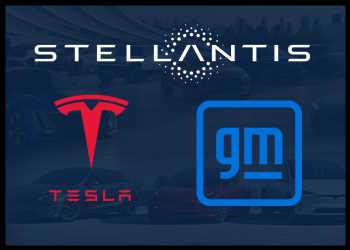Tesla Most Fuel Efficient In 2021; Stellantis And GM Ranked Worst: EPA

Tesla Inc. recorded lowest carbon emissions and highest real-world fuel efficiency among large manufacturers for model year 2021, while Stellantis was the worst, followed by General Motors and Ford, according to a report released by the U.S. Environmental Protection Agency or EPA.
The agency’s annual Automotive Trends Report shows that model year 2021 vehicle fuel economy remained at a record high while emission levels reached a record low.
Along with the overall industry, most manufacturers have improved new vehicle carbon dioxide or CO2 emission rates and fuel economy in recent years.
Of all 14 large automotive manufacturers in model year 2021, Tesla’s all-electric fleet recorded the lowest tailpipe CO2 emissions and highest fuel economy. Elon Musk’s car company was followed by Subaru, Kia, Hyundai, Nissan, and Honda in higher fuel efficiency.
Meanwhile, EPA noted that Stellantis, formerly Fiat Chrysler and Peugeot, had the highest new vehicle average CO2 emissions and lowest fuel economy of the large manufacturers in 2021.
GM ranked the second-worst in the industry.
Real-world fuel economy remained at 25.4 mpg in 2021, same as last year.
In model year 2021, hybrid vehicles reached 9% of all production. The combined category of electric vehicles or EVs, plug-in hybrid electric vehicles, and fuel cell vehicles increased to 4% of domestic production in the year.
As per the report, production was slightly higher in 2021, but the ongoing Covid-19 pandemic, as well as supply chain disruptions affecting the availability of semiconductors and other components, continue to challenge the industry.
Average fuel economy in the U.S. since model year 2004 has increased 32%, while CO2 emissions have decreased 25%.
The Biden administration is pushing the U.S. to slowly move away from gas-powered cars towards electric vehicles under its energy transition agenda. The government sees EVs to make up half of all new vehicle sales by 2030.
GM recently said it plans to exclusively offer consumer EVs by 2035, while Ford has set a target of attaining half of global sales from EVs by 2030.
In late October, President Biden announced $2.8 billion funding to 20 companies to expand domestic manufacturing of batteries, which are the most important component for EVs, and the electrical grid and for materials and components currently imported from other countries.
Biden also launched an “American Battery Materials Initiative” to strengthen critical mineral supply chains.
Automakers at present are in the process of gradually replacing their current supply chains mainly with the manufacturing of batteries.
Source: Read Full Article
